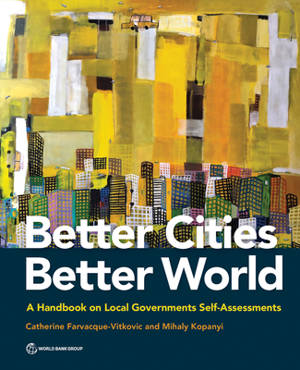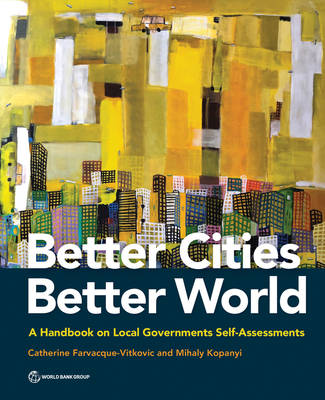
Bedankt voor het vertrouwen het afgelopen jaar! Om jou te bedanken bieden we GRATIS verzending (in België) aan op alles gedurende de hele maand januari.
- Afhalen na 1 uur in een winkel met voorraad
- In januari gratis thuislevering in België
- Ruim aanbod met 7 miljoen producten
Bedankt voor het vertrouwen het afgelopen jaar! Om jou te bedanken bieden we GRATIS verzending (in België) aan op alles gedurende de hele maand januari.
- Afhalen na 1 uur in een winkel met voorraad
- In januari gratis thuislevering in België
- Ruim aanbod met 7 miljoen producten
Zoeken
Better Cities, Better World
A Handbook on Local Governments Self-Assessments
Catherine Farvacque-Vitkovic, Mihaly Kopanyi
Paperback | Engels
€ 72,95
+ 145 punten
Omschrijving
The planet is becoming increasingly urban. In many ways, the urbanization wave and the unprecedented urban growth of the past 20 years have created a sense of urgency and an impetus for change. Some 54 percent of the world population--3.9 billion people--lives in urban areas today; thus, it has become clear that "business as usual" is no longer possible. This new configuration places great expectations on local governments. While central governments are subject to instability and political changes, local governments are seen as more inclined to stay the course. Because they are closer to the people, the voice of the people is more clearly heard for a truly democratic debate over the choice of neighborhood investments and city-wide policies and programs, as well as the decision process on the use of public funds and taxpayers' money. In a context of skewed financial resources and complex urban challenges--which range from the provision of basic traditional municipal services to the "newer" agenda of social inclusion, economic development, city branding, emergency response, smart technologies, and green investment--more cities are searching for more effective and innovative ways to deal with new and old problems. Better Cities, Better World: A Handbook on Local Governments Self-Assessments is at the heart of this debate. It recognizes the complex past, current, and future challenges that cities face and outlines a bottom-line, no-nonsense framework for data-based policy dialogue and action; a common language that, for the first time, helps connect the dots between public investments programming (Urban Audit/Self-Assessment) and financing (Municipal Finances Self-Assessment). It helps address two key questions, too often bypassed when it comes to municipal infrastructure and services financing: Are we doing the right things? Are we doing things right? Better Cities, Better World: A Handbook on Local Governments Self-Assessments offers a bit of everything for everyone. - Central governments will be attracted by the purposefulness and clarity of these tools, their impact on local government capacity and performance building, and how they improve the implementation of transformative actions for policy change. - City leaders and policy makers will find the sections on objectives and content instructive and informative, with each issue placed in its context, and strong connections between data and municipal action. - Municipal staff in charge of day-to-day management will find that the sections on tasks and the detailed step-by-step walk through the process give them the pragmatic knowhow that they need. - Cities' partners--such as bilateral and multilateral agencies, banks and funds, utility companies, civil society, and private operators--will find the foundations for more effective collaborative partnerships.
Specificaties
Betrokkenen
- Auteur(s):
- Uitgeverij:
Inhoud
- Aantal bladzijden:
- 342
- Taal:
- Engels
Eigenschappen
- Productcode (EAN):
- 9781464813368
- Verschijningsdatum:
- 30/06/2019
- Uitvoering:
- Paperback
- Formaat:
- Trade paperback (VS)
- Afmetingen:
- 190 mm x 234 mm
- Gewicht:
- 703 g

Alleen bij Standaard Boekhandel
+ 145 punten op je klantenkaart van Standaard Boekhandel
Beoordelingen
We publiceren alleen reviews die voldoen aan de voorwaarden voor reviews. Bekijk onze voorwaarden voor reviews.









